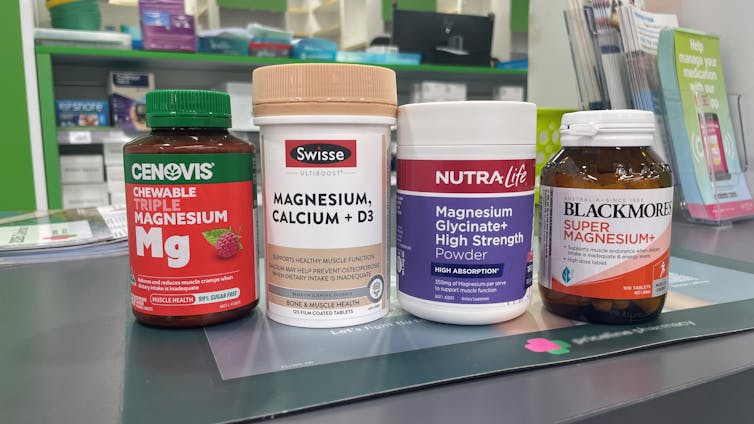Magnesium supplements are everywhere – lined up on pharmacy shelves and promoted on wellness blogs and social media.
Maybe you have a friend or family member who swears a daily tablet will help everything, from better sleep to alleviating muscle cramps.
But do you really need one? Or it is just marketing hype?
What is magnesium and why do we need it?
Magnesium is an essential metal the body needs to make and operate more than 300 different enzymes.
These enzymes build protein, and regulate muscle and nerve function, help in the release of energy from our food, and help to maintain blood function. The body doesn’t produce magnesium so we need to get it from external sources.
The government recommends a daily magnesium dose of 310–420 mg a day for adults and 30–410 mg for children, depending on age and sex.
This is easily met through a good diet. Foods rich in magnesium include nuts and seeds, whole grains, seafood, meat, legumes and green leafy vegetables.
You can even get some of your magnesium needs met through dark chocolate. It has 146 mg per 100 g of chocolate.
How do I know if I’m deficient?
People at risk of experiencing magnesium deficiency include people with restricted diets, gastrointestinal problems such as Crohn’s and coeliac diseases, type 2 diabetes, and alcohol dependence. Older adults are also more likely to be deficient.
You will only need a magnesium supplement if you show signs of low magnesium. One of the most common signs is muscle spasms and twitches. Other symptoms to look out for include low appetite, nausea and vomiting, or your heart beating abnormally.
Magnesium deficiency can be properly diagnosed by a blood test ordered by your doctor. If you need this test, it’s covered by Medicare.
What conditions can it help?
Commercially available magnesium supplements have been promoted to prevent muscle cramps, manage insomnia and help with migraines.
While magnesium deficiency is linked to muscle cramps, the cause of most muscle cramps is unknown.
And the current evidence does not demonstrate that magnesium supplements can prevent muscle cramps in older adults.

Nial Wheate
There is conflicting data as to whether the use of magnesium helps with sleep. One study reported magnesium was able to reduce the time for a person to fall asleep by 17.4 minutes while others didn’t show an effect.
For migraines, the most recent research suggests taking 122-600 mg of magnesium supplements daily for 4–24 weeks may decrease their frequency and severity.
Are magnesium supplements safe?
Magnesium supplements are generally well tolerated.
However, they can cause gastrointestinal discomfort such as nausea, abdominal cramping and diarrhoea. Magnesium causes diarrhoea by drawing water into the intestine and stimulating movement in the gut.
It is possible to take too much magnesium and you can overdose on it. Very large doses, around 5,000 mg per day, can lead to magnesium toxicity.
Most of the research investigating the clinical use of magnesium focuses on magnesium in oral formulations.
What other formulations are available?
As magnesium is a small metal ion, it can pass through skin – but not easily.
Magnesium bath salts, patches and topical cream-based formulations may be able to raise your blood magnesium levels to some extent.
But due to the amount needed each day, tablets and foods are a better source.
Things to watch out for when taking magnesium
Commercially available magnesium products can vary widely in dose, formulation and cost. Magnesium supplements have between 150 to 350 mg of the metal per tablet. Your required dose will depend on your age and sex, and whether you have any underlying health problems.
Magnesium supplements sometimes contain other vitamins and minerals, such as vitamins C and D, and the metals calcium, chromium and manganese. So it’s important to consider the total quantities if you’re taking other vitamins and supplements.
Many magnesium supplements also include vitamin B6. While this vitamin is important for supporting the immune system, high intakes can it can cause serious health issues. If you’re already taking a B6 supplement, a magnesium supplement that also includes it can put you at risk.
What if you’re considering supplements?
If you think you might be deficient in magnesium, speak to your doctor who can order a blood test.
If you suffer from migraines, cramps, or poor sleep, talk to your doctor or pharmacist who can advise on and monitor the underlying cause. It may be that a change in lifestyle or an alternative treatment may be more appropriate for you.
If you do decide to take a magnesium supplement, check you won’t be taking too much of any other vitamin or mineral. A pharmacist can help select a supplement that suits you best.

